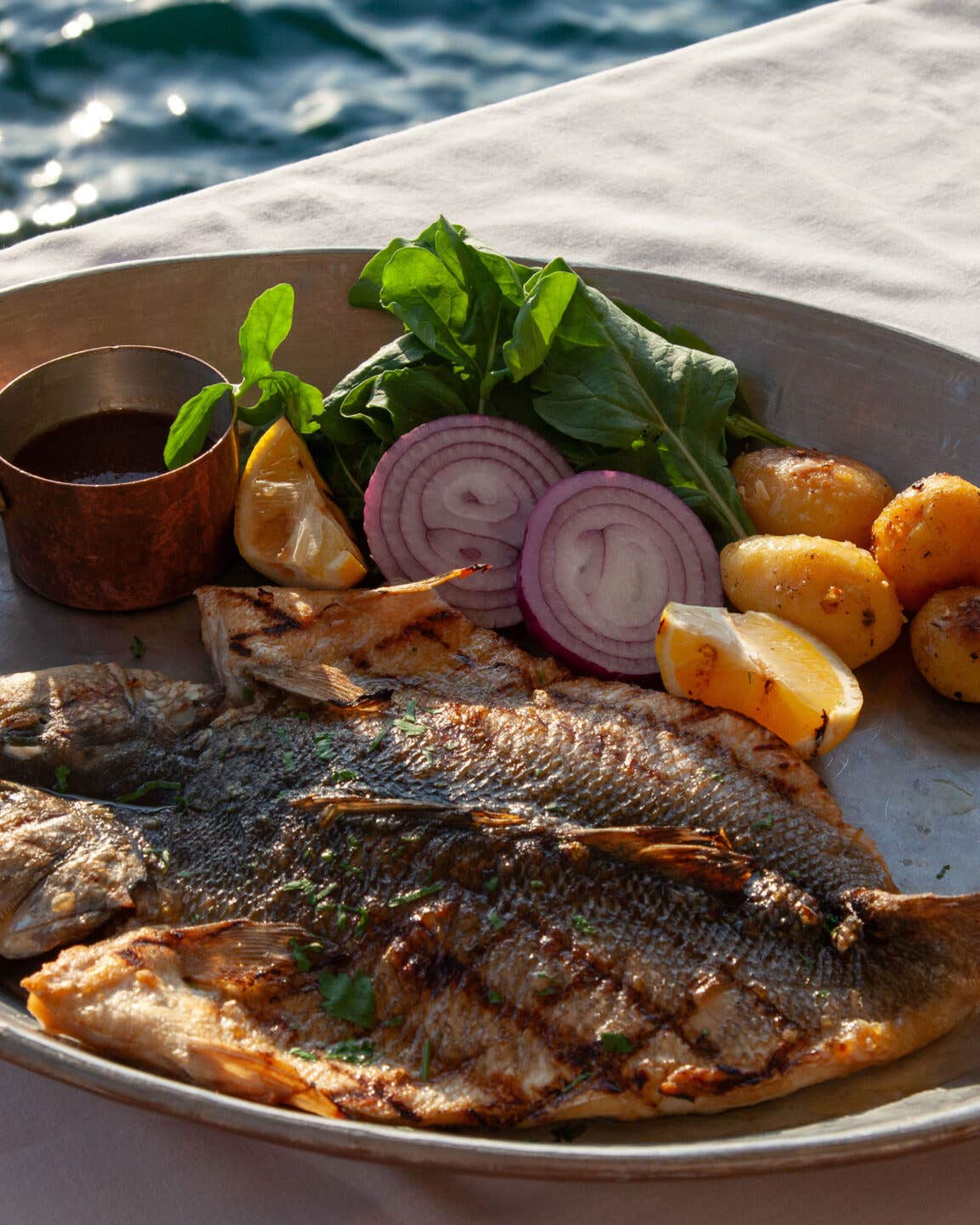
Eternal City
I didn't think there was anything strange, really, about sitting around in the Superstar Theater dressing room in Atlantic City, New Jersey, eating from Rip Taylor's pupu platter. The Ripper, as my father and all the other Resorts International Casino stagehands called the comedian, had put on his shaggy blond stage wig and was munching egg rolls, sent down as part of a preposterously overloaded catering spread from a low-end eatery at the resort called Cafe Casino.
"Take something," he said to me, gesturing to the plate of spareribs.
I looked at them pensively. "They do look good," I said and shrugged. "And they're free."
"You're LEARNing!" he yelled, reverting to his queeny, outsize stage manner. I took a sparerib. Then I took two more and wrapped them up in a cocktail napkin, for later.
I didn't know the Ripper well, though I had seen his act something like 50 times. This was 1989, and in the 11 years since my dad had started working at the casino, I had spent thousands of lonely hours in the light booth or at the back of the house, watching the likes of Buddy Hackett, Lola Falana, and the Ripper do their thing. On this night, though, I was there only to borrow $40 from my father; I had a big date and didn't want to be caught short. It was to be one of the first happy experiences I'd had since moving to Atlantic City. I took the girl to Angelo's Fairmount Tavern for veal and homemade red wine and then pushed her around in a shopping cart in the lot of ShopRite before taking her back home and losing my virginity. I was 20.
Rip Taylor was the last thing on my mind that night, but I knew his act, one of the great ones, down to the last piece of thrown confetti. His best joke, told about two minutes in, was delivered in what sounded like a single breath:
"I went down to Cafe Casino and ordered a hamburger and a hot dog, and the waitress came back with a hamburger under her arm, and I said, 'What's that hamburger doing under your arm,' and she said, 'I'm defrosting it.' And I said, 'CANCEL the HOT DOG!'"
This was during Merv Griffin's brief ownership of Resorts International—Merv being the only casino owner in the history of Atlantic City who was more interested in the talent than in the gaming. For my family, the casino was salvation. We had moved to Atlantic City in 1979 from Miami, where my mother had worked in a Coral Gables boutique and my father, a struggling abstract expressionist painter, earned a living in his family's hardware store; when it closed, my uncle got Dad a job as a stage technician in Atlantic City's first casino, which had opened the year before. It wasn't an easy transition. Mom, Dad, and I were exiles in a strange world, a semi-abandoned city by the sea that had lost its luster and was hoping to gain it back with old celebrities and new slot machines.
We cheered ourselves up with food. My father worked until nine or ten o'clock each night, and I remember waiting up for him to return with spareribs from China Land or strombolis from Mama Tucci's. When my mom died, three years after we'd moved to Atlantic City, those late-night meals and dining with Dad at our favorite haunts became a comforting routine. The city that adopted us was a ghost town, the boardwalk a monument, but the old Italian-American restaurants, the sub shops, the taverns, producing in that elegant squalor the same satisfying dishes over and over again, gave me a love of Atlantic City's food that has never left me.
Atlantic City had a few puffed-up Italian places—restaurants like Chef Vola's, located in the Chelsea neighborhood, and Scannicchio's, on California Avenue—known for serving foods like lobster tails and buffalo milk mozzarella, items as alien to the city's workaday menus as fugu. But the stagehands at Resorts were more likely to repair to places like the Lighthouse Tavern, long since demolished, renowned for its roast beef sandwiches (though my dad and I could never figure out why). Or Angelo's Fairmount Tavern, with its veal scaloppine and baked manicotti and homemade wine. Or Tony's Baltimore Grill, a pizzeria that sat a block from the boardwalk, unchanged since the beginning of time.
While Philadelphia day-trippers would flock to the White House, the famous sub shop that branded itself an institution, my father invariably favored places like Tony's and Angelo's. Maybe he recognized that, amid the proliferation of hotels and tourist traps, those relics, with their comforting insularity and fixedness, were among the few remaining vessels for the city's soul.
The unremodeled Angelo's of my father's era sat like a citadel in the middle of Ducktown, a mostly black neighborhood in the center of Atlantic City, now largely razed and rebuilt, that had earlier been an Italian-American enclave. I often wonder whether my father, a generally tolerant man, ever felt ill at ease among the Angelo's regulars, who had a reputation for being hostile to the local black residents who occasionally came in for a meal; if he was, he didn't show it. For him, the 18-seat dining room and comfortably worn bar were a solace.
The wine flowed freely at Angelo's, and the veal parmesan was dense and luscious, a thing to dream of all through a work shift. Framed eight-by-tens of baseball players lined the walls, along with movie stills from The Godfather and hagiographic images of Frank Sinatra and Dean Martin. On the floor, writ in black and white tiles, were the words angelo's fairmount tavern, est. 1936. Those faded photos of East Coast baseball clubs, their players now old or dead, would never fail to send my father into sentimental reveries, activated by red wine and loss.
And yet, for my father, Atlantic City wasn't the stuff of early memories and vanished time; it was the cultural slag heap on which his misfortunes had placed him. I never went a day without hearing, at some point, about the small-mindedness and suffocating quality of AC. His discovery, to cite one of a million instances, that American cheese was known locally as "square cheese" was as damning in his eyes as a DNA test. "Square cheese! Could there possibly be a more unimaginative term than that? Where else would they think to call it square cheese?"
That said, the parochialism that he so despised had a way of growing on him. I seldom saw him happier than at Tony's Baltimore Grill. The squat white building, with fewer windows than an adult bookstore, served little pizzas that came in a small pan and were topped with a sweet red sauce, greasy cheese, and irregular chunks of sweet Italian sausage made by an old man named Bongiovanni up the street on Atlantic Avenue. My father used to go to Tony's with the other stagehands, and I would come along, a miniature adult being indoctrinated in both the local culture and my father's half-hearted repudiation of it. He loved those pizzas even as he disparaged them. By the time he died, in 1998, my father had taken to speaking of what the sausage was like "back when Bongiovanni was still making it". It was accepted as gospel truth by Tony's regulars that, after Bongiovanni retired, the secret sausage recipe had been conveyed, presumably by armored car, to the Delaware Food Market, a grocery and meat store in neighboring Ventnor City, but somehow it just wasn't the same. Even my father had to admit it.
Tony's is still there, and I go back often. It now stands in the shadow of the immense Tropicana hotel and casino, but as far as I'm concerned, the place hasn't changed a bit. The portly waitresses in their red shirts and black pants are just as I remember them; so are the tiny, laminated menus advertising pizza, spaghetti with meatballs, fried fish platters, and open-face white-bread sandwiches of roast beef. These days, the individual jukeboxes that still furnish the booths are filled with the likes of Kelly Clarkson and Justin Timberlake, but you can always find, as inviolate as the baseball photos in Angelo's bar, Sinatra's "My Way". I can barely hear the song without wanting to cry; it makes me think of Dad sitting there in his black work clothes with three other identically dressed stagehands, telling his favorite Sinatra story over a plate of pizza crusts.
"This was in 1979," he'd begin, "before 'New York, New York' came out, and Frank was still closing with 'My Way'. Frank likes to play with the microphone cable while he's singing, so I was supposed to be paying out the cord, making sure that there was enough slack, but not so much that Frank might trip. I also had to keep the flashlight on his feet when he left the stage, so he could see where he was going. I had just started, and I was trying to do both at the same time. Frank finished up and walked toward me, and I had forgotten to move. And"—the story continued to its practiced climax—"Frank pointed at me and sang, 'Get out of MYYYY WAAAAY!'"
I think of the story whenever I'm at Tony's. And I think of how, even a mere two or three years into our stay in Atlantic City, we became tethered to oft-told anecdotes, fixed reference points, thousand-pound anchors of time and place. It seemed to us then that Atlantic City could never change. Of course, it has, as dozens of towering casinos and sleek restaurants have opened over the years. But, at least in a few poignant pockets, everything is unchanged.
Keep Reading
Continue to Next Story










